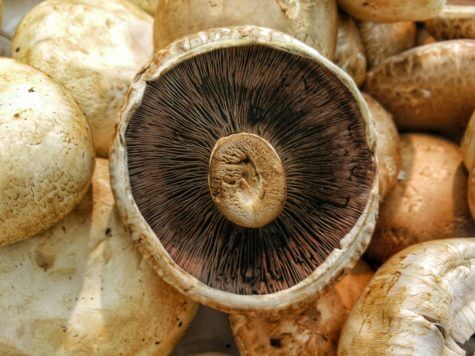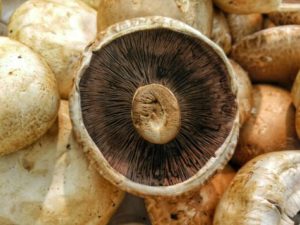
(Photo by Harshal S. Hirve on Unsplash)
STATE COLLEGE, Pa. — Mushrooms may make our favorite pizza and pasta dishes taste delightfully better, but it turns out they may help keep our brains and hearts younger too. A new study finds that some of our favorite toadstools may have high concentrations of antioxidants with anti-aging benefits.
Researchers at Penn State analyzed the chemical composition of a wide variety of types of mushrooms, finding that many contained high levels of ergothioneine and glutathione, both of which are important antioxidants.

“What we found is that, without a doubt, mushrooms are highest dietary source of these two antioxidants taken together, and that some types are really packed with both of them,” says lead researcher Robert Beelman in a university news release.
It is widely accepted that the human body’s chemical process of converting food into energy produces free radicals, which can cause damage to cells, protein, and DNA, the researchers explain.
“There’s a theory — the free radical theory of aging — that’s been around for a long time that says when we oxidize our food to produce energy there’s a number of free radicals that are produced that are side products of that action and many of these are quite toxic,” says Beelman.
Eventually, an accumulation of free radicals can lead to chronic disease and illness, including “cancer, coronary heart disease, and Alzheimer’s,” he adds. Ergothioneine and glutathione can help control those free radicals.
Beelman and his team found that the quantity of antioxidants in certain species varied, with the porcini species, which is a wild variety, carrying the highest amount of both ergothioneine and glutathione.
“This species is really popular in Italy where searching for it has become a national pastime,” Beelman says.
Meanwhile, some garden-variety types of mushroom, such as the white button, had fewer antioxidants, although more than most foods.
Interestingly, there was little evidence that cooking mushrooms significantly changed the composition of their antioxidants, particularly as it pertained to ergothioneine.
Future research could look into the ability of ergothioneine and glutathione to help prevent neurodegenerative disease, such as Parkinson’s and the aforementioned Alzheimer’s, Beelman suggests.
“It’s preliminary, but you can see that countries that have more ergothioneine in their diets, countries like France and Italy, also have lower incidences of neurodegenerative diseases, while people in countries like the United States, which has low amounts of ergothioneine in the diet, have a higher probability of diseases like Parkinson’s Disease and Alzheimer’s,” Beelman notes.
Although the relationship between mushroom consumption and neurodegeneration may be one of correlation, instead of causation, it would only take about five button mushrooms a day for Americans to close the gap, he adds.
The study’s findings were published last month the journal Food Chemistry.










I pick a number of different wild mushrooms and this was the first year that I can remember that there were essentially no wild mushrooms of any kind here in PA this summer/fall.
Pizzas and burgers provide amazing benefits of happiness!!
It would be really good to know who funded these types of studies that find “amazing” benefits from various foods and products.
Chaga , turkey tail & shitake etc have been used to cure cancer. The mushrooms unleash your immune system to deal with issues.
I know someone who ate 10 bags of Skittles every day while getting chemo for cancer. The Skittles cured them!!!!!
Sponsored by the Mushroom Growers Association
I’m sure the’re are Centurions that despised Mushrooms.
Another expensive “BS” study that keeps departments and departments heads joyfully employed.
“Science” should come with a surgeon general warning warning.
Beware, “facts” found by “science” may be proven drastically wrong tomorrow or decades later. Use “scientific” findings at your own risk.
I really do enjoy eating mushrooms, but they come out looking just like they did going in. Wish there was a way to enjoy them a second time….
I love pickled mushrooms.
I’m Italian , I crave Mushrooms. Eat a whole package of them a week for many years. I look much younger than my age , so this is interesting. But I believe its DNA related. My Mother has always looked much younger than her age and shes probably never eatin a mushroom in her life.
I’m looking at your avatar. You don’t look a day over 7.
Fountain of Youth – unless they kill you.
Shouldn’t open the article referring to “toadstools” as the healthy mushrooms in question. Toadstools are understood to be the poisonous ones.
https://youtu.be/mPqWstVnRjQ
Joe Rogan Experience #1035 – Paul Stamets
Paul Stamets is a mycologist, author and advocate of bioremediation and medicinal fungi.
Immediately thought of this as well